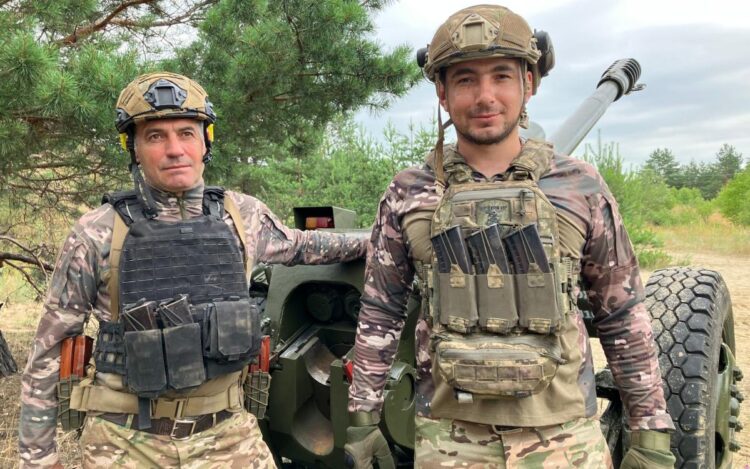
After months of fighting around Bakhmut, Yaroslav – an artilleryman in Ukraine’s 80th Separate Airborne Brigade – has studied Wagner’s mercenaries from both afar and close up.
Sometimes, he has lobbed artillery at them from 10 miles away. At others, he has stood over their corpses after machine-gun battles in the trenches.
As private guns for hire, he finds their cause beyond contempt – although occasionally, when viewing their dead bodies, he has felt a flicker of pity as a fellow soldier.
“Some are professional soldiers, but others are just used as cannon fodder,” he said on Monday, showing a grisly phone video of a battle’s aftermath.
“One night, a load of them came at us and we shot them with big-calibre machine guns – when we saw the bodies the next day, we noticed how poorly equipped they were, with a small amount of ammunition each.”
That sense of pity briefly stirred in him again, as he and his son Bogdan, who serves alongside him, mulled the fall-out of Saturday’s abortive Wagner coup attempt in Russia.
Before the attempted coup, Yaroslav said, the threadbare Wagner soldiers at least had a clear chain of command.

“These guys didn’t really know what they were fighting for before, and who knows what they will do now amid all this chaos,” Yaroslav added.
“As Ukrainians, we will plan to fight as hard as ever, but this coup will affect the morale of the Russian lines, as a lot of blood has been spilt.”
Yaroslav, 52, spoke as Russian media said Prigozhin would still face criminal charges for Saturday’s insurrection, in which Wagner troops seized Rostov-on-Don and briefly marched on Moscow.
That suggested the Kremlin intended not to honour its truce with the Wagner boss, who called the coup off after being promised sanctuary in Belarus and an amnesty for his putsch’s footsoldiers. He has not been seen in public since.
Meanwhile, Vladimir Putin held calls with leaders in Iran, his staunch ally, and Qatar, seeking to re-establish his authority after the most serious challenge his leadership has ever faced.
Nonetheless, the coup attempt will leave the Russian president wondering who in the Kremlin he can still genuinely trust.
That dilemma will also play out on the battlefield, where division in the Russian ranks may now hand Ukraine the advantage.
Despite Saturday’s crisis in the Kremlin chain of command, US officials said on Monday that they had detected no let-up in fighting by Russian forces over the weekend.
Kyiv, though, claimed on Sunday night to have liberated the village of Rivnopil, outside of Donetsk – one of nine it has now retaken since its counter-offensive began three weeks ago.
Saturday’s drama provided gruesome entertainment for Yaroslav and Bogdan, who like most Ukrainians were glued to their smartphones watching events unfold.
“You could say it was almost fun,” said Yaroslav.
“We were watching with a huge amount of interest, thinking ‘now is the time the Russians are going to make our job much easier’. Then we were kind of disappointed when the coup was called off.
Bogdan, 26, added: “We weren’t on duty at the front at the time, but our comrades who were up there did say things were a bit quieter from the Russian side.”
Unlike the Wagner legions, neither father nor son see war as a professional vocation.
But when Bogdan, a former taxi driver, volunteered for military service at the war’s outset, his father, a builder, felt he had no choice but to follow suit.
“I didn’t want to let my son go alone, and then I thought it would be easier to serve alongside him than leave him,” he said. “All we asked for at the recruiting centre was not to be separated.”
Since then, the pair have worked in an artillery battery, manning a 1973 Soviet Howitzer in battles all over Ukraine.
Fighting alongside each other, they say, has made them well-attuned to the likely front-line impact of the fall-out in the Kremlin military family.
“It will be very difficult for ordinary Russian soldiers – even those who consider themselves patriots won’t know who they should be fighting for now,” said Yaroslav.
“Imagine, also, that as a Wagner soldier, your commander tells you to march to Rostov and then Moscow, and then suddenly gives up? Of course you’d lose faith.”
Within the wider Ukrainian high command, a few harbour some grudging respect for Prigozhin, if only for his candour about how Putin’s “special military operation” has become a disaster.
As well his online rants about the huge losses his troops have faced, the Wagner leader has ridiculed Putin’s claims to be cleansing Ukraine of Nazis, saying the war has simply “legitimised” Kyiv’s government in the world’s eyes.
He has also described the Ukrainian army as one of the strongest in the world – a point that Bogdan is now looking forward to making very forcefully.
“Every day, the Russians are slowly retreating and we are slowly advancing,” he said. “And the real counter-offensive is yet to come.”
[ad_2]
Source link







